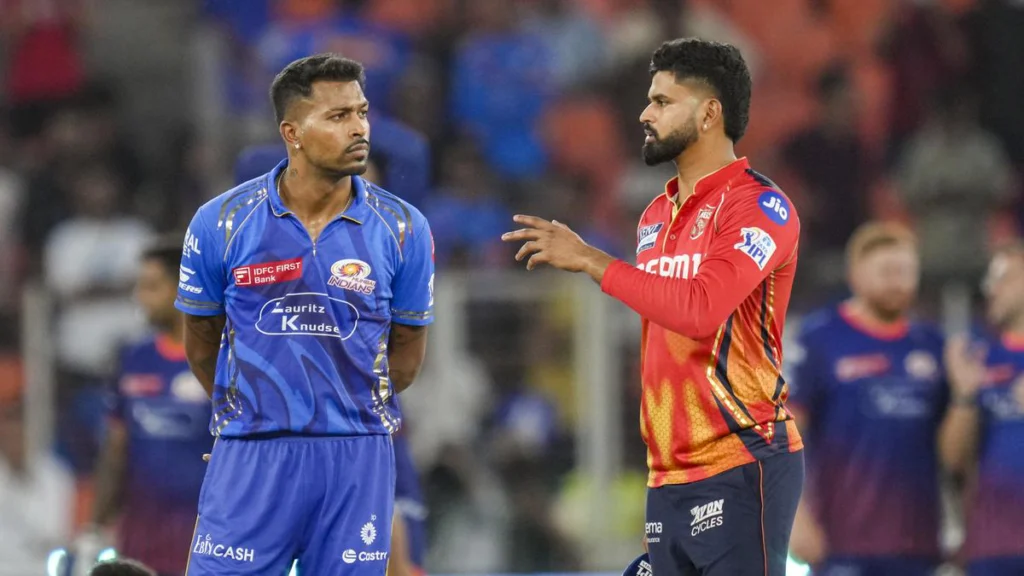Iyer, Pandya fined for slow over rate

Shreyas Iyer and Hardik Pandya Fined for Slow Over-Rate During IPL Qualifier 2
The IPL 2026 season has been a thrilling one, with breathtaking performances and nail-biting finishes. However, amidst the excitement, a familiar issue has resurfaced: slow over rates. In the recent IPL Qualifier 2 held in Ahmedabad, Punjab Kings (PBKS) captain Shreyas Iyer and Mumbai Indians (MI) skipper Hardik Pandya faced fines for their teams’ slow over rates, highlighting the league’s continued focus on maintaining pace and discipline in matches.
The Incident: Slow Over-Rate Penalties Handed Out
Both PBKS and MI found themselves on the wrong side of IPL’s code of conduct when their teams failed to maintain the required over rate during the crucial playoff match. As per IPL rules, teams are expected to bowl their overs within a specified time limit. Failure to do so leads to penalties for captains and the rest of the playing XI.
For this infraction:
- Shreyas Iyer and Hardik Pandya were fined ₹12 lakh each as captains, in line with IPL’s penalty structure for slow over rates.
- PBKS players (excluding Iyer) were each fined either ₹6 lakh or 25% of their match fees, whichever was lower.
- MI players (excluding Pandya) faced a heavier penalty of ₹12 lakh or 50% of their match fees, reflecting the repeated nature of the offense.
Understanding the Rules on Over Rates
The IPL has strict rules to ensure matches run smoothly and don’t exceed the allocated time. Teams must complete their innings within 90 minutes, including strategic timeouts. Delays beyond this—often caused by excessive field adjustments, long discussions between overs, or slow bowling—lead to slow over rates.
For first-time offenses, captains are fined ₹12 lakh, while players face a smaller fine. Repeat violations can lead to stiffer penalties, including higher fines and even suspension for captains. The IPL hopes this system encourages teams to respect timelines, keeping matches exciting and viewer-friendly.
What Led to the Slow Over Rate in Qualifier 2?
Qualifier 2 was a high-pressure match with a lot at stake. Both PBKS and MI fought hard for a spot in the final, and naturally, strategic discussions and field adjustments took more time. In such intense situations, it’s common for captains and bowlers to take extra time between deliveries. However, the rules remain clear: the time limit must be observed.
Sources suggest that both teams took longer than permitted to complete their overs. Frequent bowling changes, field realignments, and discussions with bowlers likely contributed to the delays. Additionally, the packed stadium and player movements may have slowed the pace of play.
Reactions from the Cricketing Community
While fines for slow over rates are not uncommon in the IPL, this incident drew mixed reactions from the cricketing community and fans. Some fans expressed disappointment, suggesting that players should maintain discipline, especially in key matches like qualifiers. Others felt that the nature of high-pressure playoff matches naturally leads to longer games and should be considered.
Former players and commentators weighed in as well. Many noted that while penalties are necessary to enforce rules, they should be balanced with the realities of intense match situations. “Captains need to think on their feet, but they also need to ensure the game flows,” one commentator remarked.
A Wake-Up Call for Teams?
The penalties for Iyer, Pandya, and their teams serve as a reminder of the importance of maintaining pace in the IPL. Both PBKS and MI will likely review their approach to in-game strategies, ensuring that future matches don’t incur similar fines. Teams might consider quicker decision-making and reducing unnecessary delays, especially during field placements and bowling changes.
For the captains, this could mean setting clear pre-match plans and ensuring bowlers and fielders understand their roles to minimize delays. Moreover, coaching staff may work with players to develop efficient communication methods, ensuring seamless gameplay even in high-pressure situations.
Impact on Players and Teams
Though the fines may seem substantial, for high-profile players like Shreyas Iyer and Hardik Pandya, the monetary penalties are unlikely to cause significant personal financial impact. However, repeated offenses can lead to suspensions, which would affect both the player’s reputation and team performance. For MI and PBKS, missing a key player in a crucial match could have serious consequences.
Moreover, for the other players, the fines—even if smaller—serve as reminders of their responsibility in maintaining the game’s flow. Team management and support staff might emphasize the need for discipline in upcoming matches to avoid similar issues.
The Bigger Picture: IPL’s Stance on Game Flow
The IPL has consistently aimed to ensure matches are entertaining, fast-paced, and engaging. Slow over rates not only disrupt this flow but also lead to extended broadcasts and viewer fatigue. By enforcing penalties, the league sends a message to all teams about the importance of time management.
As cricket continues to evolve with innovations like shorter formats, the emphasis on maintaining pace becomes even more crucial. Fans today expect matches to be lively and efficient, and organizers are keen to meet these expectations.
Looking Ahead
With the IPL final just around the corner, teams are now more aware of the consequences of slow over rates. Coaches and captains will likely emphasize strategies that balance thoughtful decision-making with the need to maintain game pace. While the fines for Iyer, Pandya, and their teams are a setback, they also present an opportunity for learning and improvement.
As fans, we can expect upcoming matches to be even more exciting—not just for the cricketing action, but for the renewed focus on keeping the game flowing smoothly.






